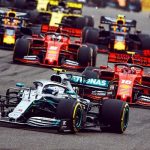‘Our buyers demand innovation’. By 2025, half of the cars Porsche sells will be electrified, says chief executive Oliver Blume.
The CAR inquisition
OLIVER BLUME PORSCHE CEO
For a sports car company that has wrought some of the world’s finest combustion engines, Porsche is embracing the electrified future with almighty zeal. And the figurehead of this push is Oliver Blume, coming up for five years as company CEO, a towering, silverhaired 51-year-old engineer who introduces himself with an informal ‘Call me Oliver’.

There’s a progressive and youthful feel about Porsche, and not just because the board are more Generation X than Baby Boomers. Porsche has launched a Digital division, with outposts in Silicon Valley and Tel Aviv, investing €1 billion in future tech for connected and ‘highly-automated’ cars, startups and online services.
But that’s dwarfed by the €9 billion (£8bn) being poured into pure electric and hybrid powertrains, with the goal of electrifying 50 per cent of all Porsche sales by 2025. Yup, half. ‘It’s a very realistic figure because of our electrification strategy,’ says Blume. The CEO name-checks three pure EVs due on the market by 2022: the Taycan sports coupe for which he has 15,000 firm orders; the Taycan Cross Turismo, a jacked-up shooting brake, scheduled before year’s end; and a zero-emission Macan SUV. ‘We can get to 50 per cent independently of the 911 and the 718 [going electric],’ he asserts.
The Macan will be the first car on the solely electric PPE platform, co-developed with Audi: for now Porsche is keeping its pure EVs and combustion cars separate. So the e-SUV will probably be sold alongside an updated version of today’s Macan – Porsche’s best-selling vehicle in 2019 – in which the petrol engines will be hybridised. No diesels, of course – Porsche ditched them in the wake of the Dieselgate scandal, although it still had to swallow a €535 million (£475m) fine last year for once selling cars that breached emissions regulations.
Now it’s all about electrification, even for the sports cars. ‘The 911 we can combine with a hybrid, like we used in motorsport. The 919 won Le Mans three times and we can carry the concept over to the 911 with a powerful hybrid version,’ Blume explains. Indeed Porsche has future-proofed the current 992 generation’s dual-clutch transmission to go hybrid.
And will the 718 Cayman/Boxster replacements be pure electric? ‘We haven’t yet decided which direction we will go. We’re working on different concepts, cool concepts, and will take the decision this year,’ says Blume.
The 982 718 Cayman/Boxster was by far Porsche’s lowest-volume range in 2019, with just 20,467 sales; the 911 range sold 34,800. Compact sports car sales are in serious decline, but Blume gives no reason to fear for the mid-engined four-cylinder car’s future.
Porsche sold a record 280,800 cars in 2019, generating an operating profit of €4.2 billion (£3.7bn) – more than the entire VW brand from 6.28 million vehicles shipped. Porsche remains a phenomenal money maker for the VW Group, but executives both at the Zuffenhausen HQ and at VW clearly believe it’s a greater risk to tread water than transform the company.
‘Customers do not just buy a sports car because they want to drive fast. Our customers also demand that our vehicles can be driven and produced as sustainably as possible. Porsche will always remain innovative and dynamic, while simultaneously becoming more and more efficient.’
The Taycan order base shows the upside of electrification: half of the ballistic zero-emissions sports car’s customers are new to the brand. ‘They are first movers, very interested in sustainability, innovation and digitisation,’ says Blume. And aside from being wealthy, they are also younger than Porsche’s traditional customer base.
The CEO sounds proud that Porsche has reduced its carbon impact by 75 per cent in the last five years, and is auditing its development, production and supply chain processes to implement its vision of being a zero-emissions manufacturer. He accepts that current battery production is insufficiently green, but the Porsche Digital mindset will help find another way. ‘We will push our knowledge to develop future batteries, solid state, which need less minerals such as lithium and less energy [to manufacture].’
And the endgame? ‘We are developing from being a manufacturer of exclusive sports cars into a provider of exclusive and sporty mobility,’ he concludes. The transformation to Porsche v2.0 is very much underway.
Six questions only we would ask
What was your first car?
‘A Volkswagen Beetle, as for so many of my age.’
Which achievement makes you most proud?
‘I am proud when we achieve something great as a team. A current example is the Taycan: a new vehicle with new technologies, built in a new factory with a new team.’
What’s the best thing you’ve ever done in a car?
‘The first time I set foot in the Taycan. It was mind-blowing.’
Tell us about a time you screwed up?
‘Everyone makes mistakes. It is important to learn from them, and not to make the same mistake twice.’
Supercar or classic car?
‘Both! My heart is especially attached to the 991 911R.’
Company curveball: you’re investing €9bn in electrification, but how much is going into petrol engines?
‘Combustion engines are the core of Porsche, especially with the 911. We’ve underlined our investments in future tech, but we are also making huge investments in combustion engines…’

